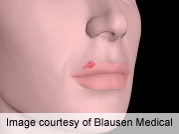- Double Mastectomy May Offer No Survival Benefit to Women With Breast Cancer
- Toxic Lead Found in Cinnamon Product, FDA Says
- Certain Abbott Blood Sugar Monitors May Give Incorrect Readings
- Athletes Can Expect High Ozone, Pollen Counts for Paris Olympics
- Fake Oxycontin Pills Widespread and Potentially Deadly: Report
- Shingles Vaccine Could Lower Dementia Risk
- Your Odds for Accidental Gun Death Rise Greatly in Certain States
- Kids From Poorer Families Less Likely to Survive Cancer
- Tough Workouts Won’t Trigger Cardiac Arrest in Folks With Long QT Syndrome
- At-Home Colon Cancer Test Can Save Lives
Frequent Cold Sores Tied to Genetic Mutation in Study


TUESDAY, Sept. 17A gene mutation explains why some people develop cold sores while others do not, according to a new study.
Cold sores — blisters that appear on and around the lips — are caused by the herpes simplex virus type 1 (HSV-1). Between 80 percent and 90 percent of people are infected with the virus, but only about one-quarter of them get frequent cold sores.
Scottish researchers analyzed blood samples from people affected by cold sores and found that they have a mutation in a gene called IL28b. This mutation means the body can’t mount an adequate immune response to HSV-1.
“Most people carry the cold sore strain of the herpes simplex virus, but until now we never knew why only some of them develop cold sores,” Professor Juergen Haas, of the University of Edinburgh, said in a university news release.
“Knowing that susceptibility to the virus involved relates to people’s genes reinforces the need to research not only the evolution of viruses themselves, but also the susceptibility of hosts to infection,” Haas said.
The study was published in the journal PLoS Pathogens.
The IL28b gene also is linked to treatment responses for hepatitis C patients. If this gene is mutated, patients are less likely to respond as well to treatment. The research provides further evidence that a single genetic mutation can be linked to different viruses, Haas said.
More information
The Nemours Foundation has more about cold sores.
Source: HealthDay
Copyright © 2024 HealthDay. All rights reserved.










